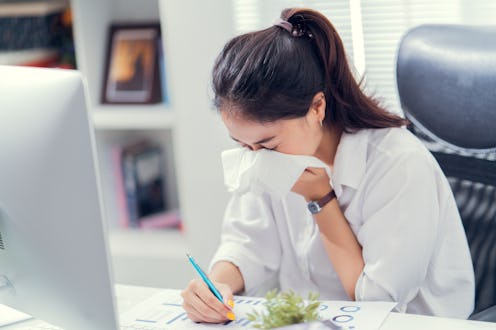Life
What Happens To Your Body When You Go To Work With A Cold

It’s beginning to look a lot like cold and flu season. With all the sneezing, sniffling, and coughing comes the age-old question: should you go to work when you’re sick? The answer is likely unsurprising to anyone who’s shared a workspace with someone sniffling.
In short, no. As you probably know, one of the first things to do when you’re sick is to stay home from work. Not only is the common cold easily spread, it also doesn’t have a “cure,” a pill or antibiotic you can take to make it go away. Because the cold is a viral infection, there is no vaccine or cure-all for it. Unfortunately, you just have to let it run its course which Mayo Clinic says is typically a week to 10 days for most healthy adults.
However, as its name suggests, the common cold is...well, extremely common. Mayo Clinic also reports that the average adult can expect to get two or three colds every year. Additionally, staying home and missing work aren’t always realistic or possible for everyone. In the unfortunately likely reality that you need to go to work when you have a cold, here are some things that can happen to your body.
You’re Likely Delaying Your Recovery
It’s no secret that you feel extra sleepy when you’re sick. And, if it’s any consolation, that heightened sleepiness isn’t just in your head. One 2017 study suggests that the sleepiness associated with sickness is caused by certain neurons “turning down activity in the nervous system cells,” specifically ones that help keep you awake.
“Sleep is vitally important in helping both people and animals to recover during sickness,” study lead author David M. Raizen, MD, PhD, an associate professor of Neurology and a member of the Center for Sleep and Circadian Neurobiology, said in a release. “Similar signaling may operate in humans and other animals to regulate sleep during sickness. These findings create a launching pad towards future research into the mechanisms for illness-induced sleepiness in humans and other organisms.”
In addition to drinking fluids to stay hydrated and taking painkillers as needed, Mayo Clinic’s recommended treatment includes lots of rest. Your body uses sleep to fight illness, creating proteins in your immune system that help make you healthy. Staying awake and moving around (read: going to work) is likely may be doing more harm than good.
You’re Less Productive Than If You Would’ve Stayed Home
It is such common practice — people going to work when sick — that there is a word for it: Presenteeism. A 2004 issue of the Harvard Business Review defines presenteeism as “the problem of workers’ being on the job but, because of illness or other medical conditions, not fully functioning.” And make no mistake, you are less productive when you go to work when sick.
One Journal of the American Medical Association found that there is greater productivity loss resulting from people attending work when sick than absence-related productivity loss. In other words, it’s better for both you and business if you stay home when you’re sick.
You’re Spreading Germs
This is, of course, likely no surprise, but staying home isn’t just good for you; it’s good for everyone around you. The Centers for Disease Control and Prevention lists “[staying] at home while you are sick” at the top way to protect others from catching your cold. Again, the common cold is a viral infection and a contagious one at that. It spreads through close contact with infected people. Staying home from work is the best way to keep your coworkers, your fellow commuters, the barista at your morning coffee place, and yourself from getting sick or sicker.
As far as what to do if you’re sick and have to go to work: sneeze into a tissue or in your sleeve, avoid touching shared surfaces, and, for the love of all that is healthy, wash your hands.
Studies referenced:
Iannacone, M. et al (2017) The RFamide receptor DMSR-1 regulates stress-induced sleep in C. elegans. eLife, https://elifesciences.org/articles/19837
Stewart, WF et al (2003) Cost of Lost Productive Work Time Among US Workers With Depression. JAMA, https://doi.org/10.1001/jama.289.23.3135
This article was originally published on